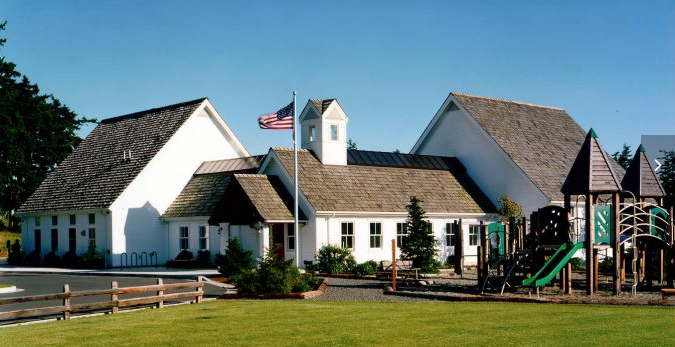— by Susan McBain, Orcas Issues Reporter —
The commissioners of the Orcas Island Health Care District continued putting the pieces of their complex puzzle into place at their weekly meeting on May 29. They began the broad discussion of what kinds of services to seek in their contracts with providers; they moved closer to understanding the current and projected finances of the island’s major providers, UW Medicine (UWM) and Orcas Family Health Center (OFHC); and they decided that tax-exempt bonds were the best approach to financing expenses the District will incur until May 2019, when levy funds become available.
Commissioner Art Lange began the discussion of what model of service would best serve the Orcas community. At one end of the spectrum is the “medical home” model, which puts emphasis on prevention and the whole patient. Although this model can reduce overall health care costs, it requires more time per patient and a broader physician skill set. At the other end, the focus is on briefer diagnostic visits and more referrals to specialists if needed. “The model we choose influences our staffing, and we have a responsibility to the taxpayers not to pay for excess capacity,” said Lange.
Commissioner Diane Boteler felt that broad physician skills are particularly important on an island, where referrals to specialists require extra time and costs. Urgent care is also important, particularly for nonresident property owners and tourists. “Tourists are people too,” she noted, “and are part of the health care equation on the island” as a big part of its economy. Data on numbers of patients (including EMS calls) who are residents, nonresident owners, and tourists would be helpful, especially for estimating levels of demand for medical services during peak periods.
Commissioner Patty Miller wanted clear breakdowns of the costs of care, such as the cost of basic primary/urgent care during standard clinic hours and the cost of urgent after-hours care in various models (such as on-call versus staffed). She and Boteler agreed that an on-island physician after standard hours is essential. Miller felt after-hours care should be provided through partnerships among providers. “I want to get to the point that we have collaboration among the service providers, because that’s the only way we’ll get to a sustainable model.”
Miller also wanted the District’s contracts with providers to include “mutually agreed-upon customer service, satisfaction, and financial metrics,” noting that development of such metrics would take time and work. She hoped the providers would work with the District to pursue rural health clinic designation as well, and to pursue amendments to Medicare legislation related to hospitals with 50 beds or fewer.
After discussions as to what constitutes “primary care” and “urgent care” in rural settings, Boteler agreed to write general descriptions of these services, but she emphasized that meeting with the providers was also an essential step. Boteler and Miller agreed to organize discussions with the two clinics and EMS. During this discussion, Commissioner Pegi Groundwater suggested the Commission divide its planning into short-term (two-year), medium-term, and long-term goals, “because we’ve got a lot to learn.” The commissioners agreed that in the short term they will work mainly with those three providers.
Lange emphasized his view that “whatever we discuss here is just framing where we think we want to go; the basic process is going to be one of negotiation. There will need to be compromise, and there will be multiple explorations of everything.”
The finance committee reported next. Miller has done an interim budget through December and a draft resolution to submit to the County Council as part of the Commission’s loan request, but she needs to determine if a public hearing is necessary for an interim budget, as it is for a final budget. Groundwater expressed concern that the interim budget makes it appear as though the Commission has agreed to accept ownership of the UWM building from the Orcas Medical Foundation, which it has not. She suggested those figures be indicated as contingent. The resolution, asking for a $400,000 loan (or perhaps two $200,000 loans) for one year, must be put on the County Council agenda by the County Finance Committee, and Miller will pursue that.
For longer-term financing, Miller feels that Washington Federal’s terms are best, offering incremental draw-down steps based on the maximum and minimum draw-down that the Commission thinks will be needed. Those steps will be built into the loan documents. The committee has decided that a tax-exempt bond is the best financing vehicle, even though additional bond counsel and associated costs will be required.
The finance committee members (Miller and Commissioner Richard Fralick) will talk with UWM officials this week about UWM’s 2019 budget. They hope to clarify the basis of UWM’s budget numbers and determine the effect of changes at the clinic (such as the addition of Dr. Camille Fleming to the practice beginning in September) on costs. The current UWM contract with OMF ends June 30, but UWM is ready to begin negotiations with the District now. Miller indicated that the committee had previously received good historical and projected financials from OFHC and that committee members would be working with OFHC to obtain updated projections as well as to discuss performance metrics.
The legal committee reported that both general and bond attorney firms have been retained. The committee is talking to two firms about insurance: MacIlvennie Associates, an insurance broker familiar with government districts, and Enduris, a government-entity risk pool operating as a not-for-profit membership organization.
The communications committee convened the first meeting of its advisory group, which identified a number of vehicles and strategies for communicating with the public and receiving responses in return. Priorities will be the District’s website (orcashealth.org), news organizations (Orcas Issues and Islands Sounder), and an email list, which will need to be created. Systematic surveys will be needed to obtain public opinion; public forums and articles in publications such as the Senior Center newsletter are other possibilities. Groundwater noted that her experience as an insurance navigator suggests that many seniors are hard to reach via Internet communications.
The staffing committee has completed a job description for a minutes taker and is working on one for a superintendent. Groundwater needs legal advice as to whether sharing a superintendent with another district is permitted.
The technology committee reported that final Commission agendas, minutes, and resolutions are being posted on the Orcas Island Health Care District site, orcashealth.org. Boteler is creating a formal email list to which community members can subscribe to keep abreast of District activities. Miller raised the concern that the process needs to ensure permanent storage of commissioner emails in order to meet state requirements for records retention. Boteler will explore the issue with the web host.
After a quick run-through of what will hopefully be the final edits on the Commission’s by-laws, the meeting adjourned. The next meeting is Tuesday, June 5, at 4 p.m. at Orcas Library.
**If you are reading theOrcasonian for free, thank your fellow islanders. If you would like to support theOrcasonian CLICK HERE to set your modestly-priced, voluntary subscription. Otherwise, no worries; we’re happy to share with you.**








Thank you, Susan, for your reporting. As always, your detail and clarity make me feel that I have the pertinent information even though I was not able to be there.